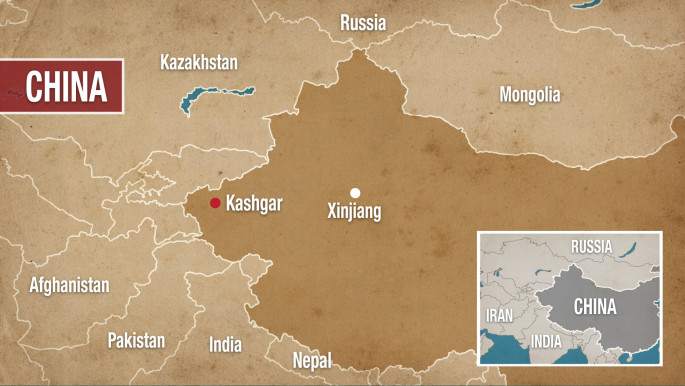
Pakistan's deafening silence over China's persecution of Uighur Muslims
Sounding almost reverential, Mr Khan called China's growing economic support for Pakistan "a breath of fresh air" amid the "doom and gloom".
In recent years, China's crackdown on those who practice, or even identify with Islam, has reached horrifying levels. Under the guise of preemptive measures against terrorism, in the far northwestern region of Xinjiang, up to a million Muslims, mostly ethnic Uighurs, remain in detention inside what the Communist Party propaganda maintains are "education and training centres".
The testimonies of detainees who have passed through these centres, that Amnesty International claims are being run like wartime concentration camps, are replete with reports of torture including waterboarding and force-feeding. According to eyewitnesses, the situation is so horrific that some of the detainees have even committed suicide.
The Chinese state has incarcerated everyone from professors, journalists, comedians, editors and poets to nursing mothers, children, the elderly and even the terminally ill inside these detention centres.
Also, Muslims are being subject to invasive surveillance, with Communist Party workers being placed inside Muslim households to observe and report on their daily activities. Mosques have been demolished and restaurants serving halal meat forcibly shut down.
 |
Pakistani security agencies have shut down Uighur businesses and repeatedly detained Uighur activists residing in the country |  |
Only this month, the government announced a five-year plan aimed at "Sinicising" Islam to make it "compatible with socialism". Activists however warned that this campaign would gradually lead to a total eradication of the religion - with which 23 million Chinese identify - in the country.
While some experts have called Beijing's ferocious anti-Muslim scourge the "country's most intense campaign of coercive social reengineering since the end of the Cultural Revolution", others maintain that it amounts to outright ethnic cleansing.
Moreover, this repugnant campaign is set to expand, as the regional governments with sizeable Muslim populations across the country are dispatching officials to detention centres in Xinjiang with the explicit aim of learning to and adopt the same measures.
Twitter Post
|
Given this grim situation, the premier of a neighbouring Muslim-majority country and a professed "Islamic Republic" appearing to give a free pass to Beijing, should raise a few eyebrows.
In addition to Mr Khan, Pakistan's President Arif Alvi went a step further and in a recent interview, expressed full support for Chinese actions vis-a-vis its Muslims while calling the increasing concerns about country's crackdown on Islam a false "bogey" to "pressure China".
This comes as no surprise, as China, now Islamabad's largest trading partner, has pledged to invest around $US62 billion in the China-Pakistan Economic Corridor (CPEC), a vital project in its ambitious One Belt One Road initiative.
The project, already riven with accusations of arbitrary land-confiscation from local communities in Pakistan, is now implicitly buying Islamabad's silence in the face of grave human rights abuses against the Chinese Muslims.
And Beijing has chosen to extend its repression of Uighur Muslims beyond its borders into Pakistan. According to some reports, in an effort to appease its powerful neighbour, Pakistani security agencies have shut down Uighur businesses, repeatedly detained Uighur activists residing in the country and closed down schools teaching Uighur language.
Also, dozens of Uighur women married to Pakistani citizens have been separated from their children and held in Xinjiang's detention centres.
Viewing Beijing as its strategic regional ally against arch rival India, and a vital partner that could play a central role in reviving the country's fledgling economy, Islamabad has conveniently chosen to remain silent on China's extensive abuses. This is in stark contrast to its vocal positions on human rights abuses in places such as Palestine, Myanmar and Indian-controlled Kashmir.
 |
China has pledged to invest around $US62 billion in the China-Pakistan Economic Corridor |  |
Pakistan's ruling class remains convinced that even the slightest criticism could prove to be disruptive for its special relationship with Beijing, and possibly even derail the flagship CPEC project. The reality, however, presents a far more complex picture.
A staggering 85 per cent of China's oil imports pass through the Strait of Malacca, a narrow shipping corridor connecting the Indian and Pacific oceans. Experts point out that Beijing's crippling dependence on the corridor, policed jointly by Indonesia, Malaysia and Singapore, is set to be substantially alleviated by the CPEC.
While the countries policing the Strait largely enjoy warm relations with China, both Malaysia and Indonesia are parties, at varying degrees, in the hotly-disputed South China sea.
 |
|
Considering the fact that India has recently made serious overtures towards exerting control over it, the necessity of ending its over-dependence on this corridor becomes even more pressing for Beijing.
In this scenario, rather than viewing the project as an inhibition, Pakistan has the potential to see it as a point of strategic leverage, and encourage Beijing into compliance with international human-rights norms. That said, as long as Islamabad faces a hostile administration in Washington, the country is hardly in a position to bargain on its standing with China.
For now, Beijing appears to have the upper hand and will likely even get away with its awful treatment of Muslims, but a concerted effort by the international community, and particularly Pakistan, could force China to change tack and alleviate the continued suffering of its Muslim minorities.
Umar Lateef Misgar is a political analyst. His work has appeared in The Independent, Truthout.org, London School of Economics Human Rights Centre blog, and elsewhere.
Opinions expressed in this article remain those of the author and do not necessarily represent those of The New Arab, its editorial board or staff.





 Follow the Middle East's top stories in English at The New Arab on Google News
Follow the Middle East's top stories in English at The New Arab on Google News


